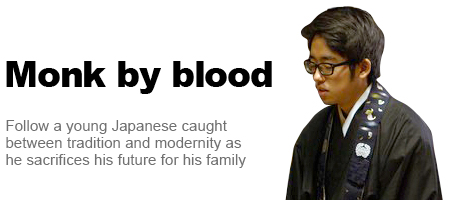One young Japanese struggles with his destiny as the next in line to take over his family’s 800-year old temple.
Modern-day Japan is a complex nation struggling to combine tradition with the demands of a globalised world.
With rare access to a traditional family temple in Japan, Scion Sasaki’s story captures the struggle of a nation as he questions his future dictated by more than 20 generations past.
He is destined to become the next head monk and run his family temple in Kyoto, Japan, before he turns 30 years old.
Returning home to Japan, this DJ by night and trainee monk by day knows what inevitably lies ahead of him, but how does he come to terms with it?
| Filmmaker’s view: |
By Ema Ryan Yamazaki
Perhaps because I have spent substantial time both living inside and outside of Japan, I have often found myself somewhere between being an insider and an outsider of the culture.
Ema Ryan Yamazaki Raised in Japan and England, Ema is a documentary filmmaker and editor with a particular interest in telling stories that lie in-between cultures. She is dedicated to capturing stories about Japan through her unique perspective as both an insider and outsider of the country. As an editor, her work has appeared on HBO and PBS, and has screened at the Cannes Film Festival, Telluride Film Festival, Palm Springs ShortsFest, and the Director’s Guild of America, among many other venues. Currently residing in New York City, Ema is developing documentaries about various aspects of Japanese culture.
Bao Nguyen: is a Saigon-based filmmaker and photographer whose work has been featured by The New York Times, Rolling Stone, MTV, Vogue,HBO, PBS, among many others. He has directed, produced, and shot a number of short films, which have been played to international audiences in numerous festivals and museums. He is currently producing his first feature narrative, 2030, a futuristic film set in Vietnam after the impact of climate change. He is also directing his first feature documentary about the Vietnamese LGBT community and the pending same-sex marriage legislation in Vietnam. |
To me, Scion’s story is also one of an in-betweener – caught between eastern and western ways, tradition and modernity, destiny and dream. Scion has the advantage of being able to crossover and enjoy multiple worlds, while also facing the restrictions of only partially being a part of any world.
In many ways, Japan also finds itself caught between different worlds, trying to maintain the respect for its traditions while experiencing the impact of globalisation; it has to accept the inevitable fact that some treasures of the past will be washed over by new customs.
Compared to the post-war era, the youth and even the adults of today seem to be more detached from religious communities, ceremony and spirituality, resulting in a deceasing number of family-run temples. Scion and his family are thinking ahead, facing the question, “What can we do to be a temple that people will want to be a part of?” The answer to this question is their key to survival in the 21st century.
Being only a couple of years older than Scion, I acknowledge that we grew up at a time when the youth has more control than ever over their own life, regardless of the household they were born into.
As technological and economical advances permit the next generation to see more of the world than the generation before, rebellion against values of the past seems more common. However, Scion is no ordinary youth. Regardless of his ultimate decision, what we captured of Scion at 21 years old is a young man that knows he has the tools to carve his own path, yet understands that he represents something that goes beyond his own life – that his destiny connects his family to his ancestors and holds together an entire community.
During the shoot there was a clear change within Scion as he went from feeling the burden of his destiny entirely on his own shoulders, to gradually realising that he is not alone in his journey.
It became clear to him that the temple will never only be his, even when it’s his turn. He will have the support from his siblings and parents, as well as the hundreds of temple members that have known him since he was a child.
He also realised that whether he decides to take over the temple or not, he owes it to his family to clearly explain his decision. “We are Monks by blood,” Scion’s father told me. “But we also must become priests by will.” It is not enough for Scion to accept his destiny – he must make it his own.




